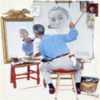Those threads I mentioned? Well, every painting is at first defined by lines, and we all have lines in our perception. Our brains perceive everything around us first as patterns of contrast, as lines, before it fills in any finer detail. We bear at the core of our being a thumbnail sketch of self. This is why the mind strives so very hard to assert its self orientation regardless of our level of distress and disorientation.
What are these lines in personal down to earth terms? Beliefs, and even infants have beliefs. Belief seems to defy reason, and it does so because it precedes reason. Our core beliefs have for their substrate the very genetic pool of humanity, the collective unconscious. We need not opt into these beliefs. We embrace them as soon as we begin processing sensory experience itself.
People easily lose touch with belief. They can come to deny that they believe anything at all. Why is this? No infant is a nihilist.
Because they have to admit what they believed was wrong, so for a brief time they don’t know what to believe.
Their created self-image?
What do infants believe?
Life is adventure? They believe their feelings. Where science was previously mistaken is in crediting infants with only a limited range of feelings. They display a rather broad range of emotional sensitivity and potential reaction, as perhaps evidenced in the recent viral video where the young girls mom was singing a sad love song, and the child expressed no fear, nor did she throw a tantrum, she just began to tear up, almost wistfully. She even seemed to make some effort to compose herself, behaved as if she fully understood the emotion expressed in the song. I will offer that she did understand the emotion. What she did not understand was the context. The lyrical implications which are an adult interpretation of alienation of intimacy.
We begin believing in rapport. Without rapport infants can even fail to survive, even if all their biological needs are met. Do adults as a community continue to believe in rapport?
The community is more about ‘me’ then rapport. What are the consequences of rejecting the belief in rapport?
Loneliness? Which has proven even in laboratories to be on par with disease for its negative effects on health and general well being.
So what else to infants believe? They believe in pleasure. When they experience pleasure they open themselves to it readily. The pleasure of exploration, of tactile exploration, of feeding and nurturing interaction. Do adults continue to believe in pleasure?
We don’t deserve pleasure. I would offer that they failed to believe in it even as they continue to seek it. Recent scientific inquiry has substantiated that pleasure is not simply a desire, it’s a need, and it takes higher priority than even food or water. It is as necessary as air, and all of your subconscious function is structured around this relationship with pleasure. So why do adults reject belief in pleasure?
We get hurt and so become protective. Which brings us to the next infant belief. Infants believe in pain and will not hesitate to adjust their behaviour to deal with the experience of pain. They avoid even things we consider to be only emotional pain, loud noises, hurtful looks in others eyes. They believe in both pain and pleasure without question. They don’t second guess themselves. Do adults continue to believe in pain?
I think so.
Given how much we endure it, I don’t think so.
I offer that they do not. Adult experience is defined by pain. Everything is required on pain of some negative consequence. Every obligation, every rule, every moral code, has at its heart the threat of pain, and adults declare this to be right and proper, entirely sane and justified. Is this not so?
Sadly, yes. Adults do not believe in pain as pain. They believe in pain as virtue, as justice, and payment to earn reward. An infant would not offer this or even think to offer to suffer. Infants can differentiate between pain and pleasure, can adults?
Do infants believe in fear? Infants do not believe in fear. They show no ability to anticipate anything in this way, or judge things in that context. The infant beginning to walk has no fear of falling down. Even early childhood fantasies, do they involve fear?
No. I offer that fear is the source of adult confusion. That is a different topic, though it must be touched on here. How do you know when you feel well? How would you know if you were strong or healthy?
We often have to feel weak to realize what is it to feel strong. Kids take health for granted.
We know our own well being only by the experience of well being, also known as pleasure. It feels good to be well. We experience pleasure when our mind is operating well, when curiosity is the rule. We feel well when our biological needs have all been recently met. Hunger does not normally make us feel unwell. Hunger and curiosity are the same instinct. They have even found under fMRI that the sexual motivation and hunger motivation use the same basic channel. What do you think of this?
It’s the entanglement of these experiences, the neglect of them, that leads to sickness. Why do we neglect our innate drive toward pleasure?
We make rules for ourselves to follow, which make us a bit robotic.
We believe we’re not good enough? And it makes the body sick.
We vandalize belief with rationalization. We invent reasons. Does living in the world require reasons? Are they essential? Does it require purpose?
Your thoughts are welcome. Be well friends.
Travis Saunders
Dragon Intuitive
~science,mysticism,spirituality~



Leave a Reply